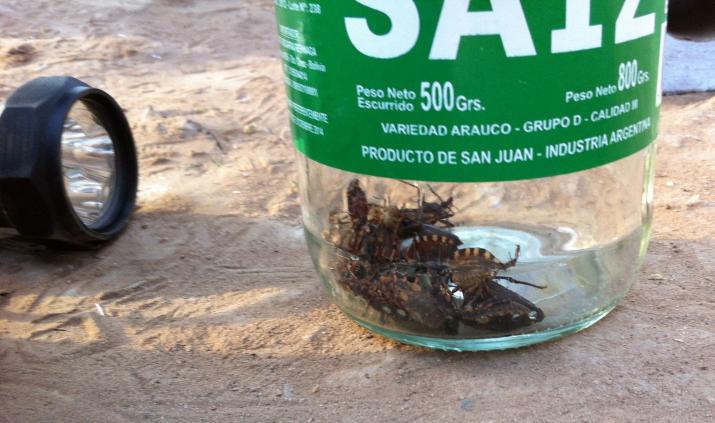
A collection of Triatomine bugs (the vector for Chagas), or "vinchucas" as they are called here. We were able to go visit houses to collect bugs for a project a PhD student is working on here in Bolivia.
Published June 1, 2013, last updated on October 2, 2017 under Voices of DGHI
By Toria Rendell (MSIII, School of Medicine, and DGHI Bains Family Research Grant recipient)
I have lived the past 7 months in Camiri, Bolivia working on a research project to identify better diagnostic methods for congenital Chagas disease. Some people from back home do not know where Bolivia is. That's not too surprising to me since I personally had never paid too much attention to Bolivia before becoming involved in research here, and Bolivia is not exactly high on the list of tourist destinations for Americans. Many people I talk to from home have never heard of Chagas disease. This is even less surprising. While Bolivia is endemic for Chagas with continued vector transmission, suggesting a diagnosis of Chagas in the US would be considered a "zebra" diagnosis.
For some background, Chagas disease is a parasitic infection with Trypanosoma cruzi, which is spread by the vector Triatomine bug (or "vinchuca" as it is called in this region), through infected blood transfusions, congenitally, and, rarely, orally through ingestion of infected fruits. Upon reaching the chronic phase of infection, Chagas is a life-long illness. The disease is highly prevalent in South America, causing about 5 times as many DALYs lost as Malaria in the Americas. A person who is chronically infected with Chagas can have Chagas cardiomyopathy, megaesophagus, or megacolon, and Chagas is a major contributor to incidence of sudden cardiac death.
In the Eastern part of Bolivia where I live, Chagas is commonplace. In our study, for example, we enroll women who give birth in the municipal hospital to screen for Chagas and conduct follow up diagnostic tests on the babies of positive mothers, and roughly half of the women are positive for T cruzi infection. About 30% of these women still live in houses where the Triatomine bug lives.
For this post, I wanted to chronicle some of the reactions I have had so far when talking to Bolivians about my work to give a picture of how the disease is viewed here (translated from Spanish, paraphrased).
- Taxi Driver: "You work on Chagas? Don't tell me that. My mother just died from Chagas. They didn't know what was wrong with her, so they did a lot of tests because her heart wasn't working. It's a terrible disease that takes people suddenly. We didn't even know she had Chagas."
- Another Taxi Driver: "Oh, you work on Chagas? If you work for one of the oil companies, they'll do a test to see if you have Chagas. I heard if you drink some very strong wine before you take that test it will come out negative even if you have Chagas. Or there's a vaccine they sell at the vet to help with a skin condition for dogs. They say that also works too. If they find out you have Chagas they won't hire you because you'll die sooner."
- Recent college graduate: "So, how is Chagas transmitted? ....ok, from the bug, congenitally....any other way?....oh through blood transfusions....any other way?...so there's no other way it can be transmitted to people?...what about sexually? can it be transmitted sexually?"
- Neighbor: "I know I have Chagas. I worry about my daughter having Chagas. Do you think she needs to be tested?"
- Acquaintance in Camiri: "I heard that the way they test for Chagas is they put the vinchuca on your arm in a box so it will walk around and bite you." 2nd acquaintance, shuddering: "Oh that is so disgusting! I could never do that. Let a bug crawl up and down my arm!" (On xenodiagnosis, which is actually one way to diagnose Chagas)
- Attorney: "You know, they diagnosed my daughter with Chagas. She has always lived in Santa Cruz, so they say she got it congenitally from her mother. Fortunately my other child does not have Chagas, and we were able to treat her. She is fine now."
- Many, many people: "Can Chagas be cured?" (not for chronic infections. It can be treated with great success in children under 15). "I have Chagas." "It's a big problem in Bolivia."
Talking to people has shown me how prevalent the disease is in Bolivia and has given me a glimpse of how people are affected. In a hospital where research studies are not normally conducted, it has sometimes been difficult to get hospital staff to understand how the study is being conducted from a research perspective. One of the pediatricians who helps us with the follow up exams on the babies shook his head, half-smiling, at our study nurse who had asked him to fill out the specific form that we use for the exam. "Vos y tu Chagas," he said.
I know that sometimes we seem a little crazy bringing our American way of running a research study to a culture that operates very differently. But I don't mind appearing a little crazy since I have this chance to work on a project that will improve diagnosis of a disease that is so prevalent and affects so many lives.


